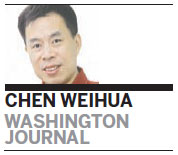A futile distraction from the United States of Secrets
Updated: 2014-05-28 11:34
By Chen Weihua(China Daily USA)
|
||||||||
The US Justice Department's announcement to indict five officers of the Chinese People's Liberation Army for cyber theft has been interpreted as a clumsy move on multiple fronts.
The indictment announced on May 19 came just days after Fang Fenghui, chief of the General Staff of PLA, wrapped up a five-day visit at the invitation of his US counterpart, General Martin Dempsey, chairman of the Joint Chiefs of Staff to improve bilateral military-to-military relations. It is also just a little more than a month before the PLA Navy will participate for the first time in the Rim of the Pacific (RIMPAC) naval exercises off the waters in Hawaii.
And the timing couldn't be worse. In July, the 6th session of the China-US Strategic and Economic Dialogue (SE&D), the highest-level annual platform between the two governments, is expected to be held in Beijing to cover a wide range of issues from economics to security.
But clearly the unilateral US actions have undermined such an important talk and the warming-up atmosphere for military-to-military exchanges and cooperation. It's not a surprise that China responded immediately by canceling the joint cyber-security working group meeting since the US shows no sincerity in pursuing a solution through dialogue. That group was formed a year ago after both sides believed it's better to sit down to talk about the issue of cyber security instead of trading accusations publicly.

The US knows too well that its action is bound to invite Chinese reaction or retaliation. And such a tit-for-tat would lead to nowhere but escalation of an issue that is critical to both nations and the rest of the world, which has not set up international rules regarding cyber space.
But if China chooses to reciprocate by indicting five people responsible for the reckless US National Security Agency global surveillance activities, it will draw big applause in countries around the world.
Many Chinese and American journalists attending the past week's US State Department briefings could not figure out why the US would make such an unwise decision at a moment when China and the US should cooperate more and when Russian President Vladimir Putin was visiting China. The US clearly does not want China and Russia to get too close, but the US indictment did not serve this purpose well.
For the Chinese, the timing is embarrassing because President Xi Jinping was hosting the 24-membrer Conference on Interaction and Confidence Building Measures in Asia (CICA) attended by many heads of state. Should China also pick a special day to announce its indictment?
So many believe if the US' intention is to irritate China and cause trouble in bilateral relationship, it has indeed achieved its goal.
The timing also is not good for the US on the eve of the one-year anniversary of the heroic revelations made by Edward Snowden, a former NSA contractor.
On May 13 and May 20, the Public Broadcasting Service, or PBS, aired a two-episode documentary: United States of Secrets. It details how the massive and secretive surveillance programs have been introduced by the US government since Sept 11, 2001, and become daily life in a national security state.
The sheer lies told in front of the press and even lawmakers included everyone from Obama to James Clapper, director of the National Intelligence. Many whistleblowers, including NSA staffers, have been persecuted. And major Internet companies, such as Microsoft, Google, Yahoo, Apple, Facebook and AT&T, have been collaborating somewhat with the NSA in gathering data from Americans and people around the world. And the NSA spends $10 billion a year to capture communications around the world, everything from international calls, emails and text messages.
Literally, Americans and people all over the world have to redefine the word "privacy" now given the intrusive NSA activities and capabilities, and many people wonder if there is privacy at all in today's world.
The world has also to redefine "national security" since monitoring everyone's email and phone calls, eavesdropping on world leaders and hacking into companies from China to Germany and Brazil all falls in this category in the US. China and the US disagree on the definition since the US would like to describe hacking into Huawei, China's telecom giant, as a matter of national security.
According to Snowden, the US would not only carry surveillance for national security, but also national interest.
I guess many in China might have regretted that they didn't keep Snowden a year ago. But Snowden's revelations, of which only 1 percent has been made public so far by the Guardian newspaper, will continue to prove that the US has completely lost its moral high ground in accusing others of cyber espionage, whether against foreign governments, individuals or corporations.
The indictment of PLA officers is just a futile distraction from its troves of dirty secrets.
Contact the writer at chenweihua@chinadailyusa.com
(China Daily USA 05/28/2014 page2)

 Music at her fingers
Music at her fingers
 Across America Over the Week (Jan 16 - Jan 22)
Across America Over the Week (Jan 16 - Jan 22)
 Spend Chinese New Year in style
Spend Chinese New Year in style
 Ili river valley becomes a popular destination for swans
Ili river valley becomes a popular destination for swans
 Philip Ma: from scientist to businessman
Philip Ma: from scientist to businessman
 Birmingham's Spotlight on China dinner
Birmingham's Spotlight on China dinner
 How to distinguish doucai, wucai, Famille-rose and enamel porcelain
How to distinguish doucai, wucai, Famille-rose and enamel porcelain
 Xinjiang lake in bumper fishing season
Xinjiang lake in bumper fishing season
Most Viewed
Editor's Picks

|

|

|

|

|

|
Today's Top News
Houston's SW Chinatown
China to focus on reforms, opening of capital market
Slowdown brings new risks to banks
Trade group calls for BIT
Market status for China is 'political' issue
Birmingham's Spotlight on China dinner
Bank takes renminbi-clearing seriously
Traditional Garb
US Weekly

|

|







